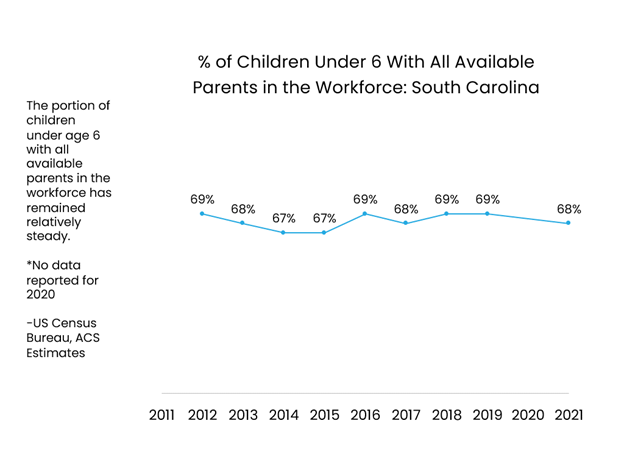Implementation Phase
TEAM RESOURCES HOME | ECOSYSTEM ESSENTIAL ELEMENTS: IN FOCUS | PAST TRAININGS | PUBLICATIONS | BLOG | TEAM DIRECTORY

South Carolina Facilitates Employer-Sponsored Child Care
South Carolina implemented six action plan strategies to support child care business sustainability efforts by facilitating employer-sponsored care. The Collaboratory team includes representatives from the South Carolina Department of Social Services, the United Way Association of South Carolina, the Child Care Resource & Referral (CCR&R), South Carolina First Steps to School Readiness, The Sunshine House, and Brookland Academy.
-
Through discussions with business leaders across the state, the South Carolina team was surprised by how little employers knew about child care and the resources available in the state. For example, employers were not aware of the voucher program and that their employees could qualify for subsidized child care. The team identified a clear need to share that information more broadly and in a different way.
-
The team, led by the United Way Association of South Carolina, developed a child care guide for employers, which details 101 steps for different child care arrangements and resources available in the state. The resources emphasize options beyond onsite care, including support for existing child care businesses.
The framework will provide standard criteria and expectations, sample contracts, and descriptions of the different models of sponsored care. Promotional materials will also be created explaining the benefits of employer-child care provider partnerships.
-
Creating a core team with diverse perspectives strengthened this strategy. The CCR&R, the United Way, the Sunshine House, and Brookland Academy brought unique strengths to the collaboration. The United Way spearheaded the effort informed by regular communication with employers about their needs. The owner of The Sunshine House provided the practical perspective of someone who had launched and expanded child care businesses. The CCR&R ensured the framework was inclusive of available training, licensing, and business support resources. The Collaboratory was a valuable tool to connect the team to resources and examples from other organizations and states.
Developing audience-specific marketing materials was important so employers could see local examples of successful employer-sponsored care models that can be replicated. The process guide will be available for employers interested in providing child care for their staff.
-
Sufficient capacity is critical for successfully implementing this work. Prior to hiring a full-time staff member, cross-sector team members divided the workload. Ensuring a dedicated staff member to support employer-based care enhanced the work’s efficiency. The position is funded through the American Rescue Planning Act.






